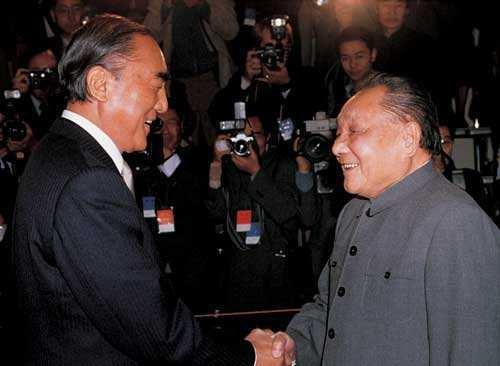According to the Japan Broadcasting Association (NHK) reported on the 29th, former Japanese Prime Minister Yasuhiro Nakasone died at the age of 101.
Born in 1918, Nakasone joined the Japanese Navy after graduating from Tokyo Imperial University in 1941, participated in World War II, entered politics after Japan's defeat, and served as prime minister from 1982 to 1987, ruling for 1806 days, making him one of the few long-lived regimes in Japan's post-war history.
It is worth noting that in the history of Sino-Japanese relations, Nakasone Yasuhiro is a very important figure, during his tenure as prime minister, Sino-Japanese relations entered a period of rapid development, the two governments, academics, and nongovernmental exchanges have reached a peak, and Nakasonemoto has also maintained close personal relations with Chinese leaders.

Nakasone also considered himself a "pro-Chinese faction" in Japan. Paradoxically, however, Nakasone's tenure also created the Yasukuni Shrine issue, which China and Japan have been unable to resolve in the future.
On August 15, 1985, Prime Minister Nakasone and his cabinet members officially visited the Yasukuni Shrine as public officials, becoming the first current prime minister of Japan to pay homage to the Yasukuni Shrine as a public official. The move first sparked heated discussions in Japan, with Japan's left-wing newspaper Asahi Shimbun taking the lead in commenting on the move, fearing that the move would trigger opposition from Countries such as China and South Korea.
In 1985, Nakasone visited the Yasukuni Shrine, setting off a storm between China and Japan.
On September 19 of the same year, at a press conference, the spokesman of the Chinese Ministry of Foreign Affairs expressed regret that members of the Japanese cabinet officially paid homage to the Yasukuni Shrine on the 40th anniversary of the War of Resistance Against Japanese Aggression, pointing out that this act seriously hurt the feelings of the Chinese people.
On November 5 of the same year, a meeting of the Japanese Cabinet passed a government statement saying that Prime Minister Nakasone's visit to the Yasukuni Shrine had no intention of restoring the reputation of the criminals. Nakazen Genren wrote a long handwritten letter to Hu Yaobang, then general secretary of the CPC Central Committee, to explain, and the two held talks the following year, and the yasukuni shrine storm temporarily passed. Since then, Nakasone has never been to the Yasukuni Shrine during his term as prime minister, but it has laid a time bomb for the development of Sino-Japanese relations in the future.
In his later years, Nakasone Yasuhiro recalled this storm, he was very sorry for "adding a lot of trouble" to the Chinese leader at that time, and after leaving office, he advocated the "separation" of Class-A war criminals, but for the Yasukuni Shrine itself, Nakasone's attitude was still "to return for the death of the national war, as a country is natural and indispensable", and advocated that both the emperor and the prime minister should visit the Yasukuni Shrine.
Within Japanese politics, Yasuhiro Nakasone, like current Prime Minister Shinzo Abe, is a "neoconservative" who, while leaning toward the right on historical issues, argues diplomatically for the United States first. What is different is that Nakasone advocated a "joint" policy toward China, and during his administration, he provided more aid to China, and the relations between the two countries were extremely close, which showed a subtle difference from the current Japanese neo-conservatives. Nakasone is also considered to have an international outlook in Japan, and is an "international" prime minister.
(Qilu Evening News, Qilu One Point, reporter Wang Yu)
Find reporters, reports, ask for help, major application markets download "Qilu OnePoint" APP or search weChat Mini Program "OnePoint Intelligence Station", more than 600 mainstream media reporters in the province are waiting for you to report online! I'm going to report it